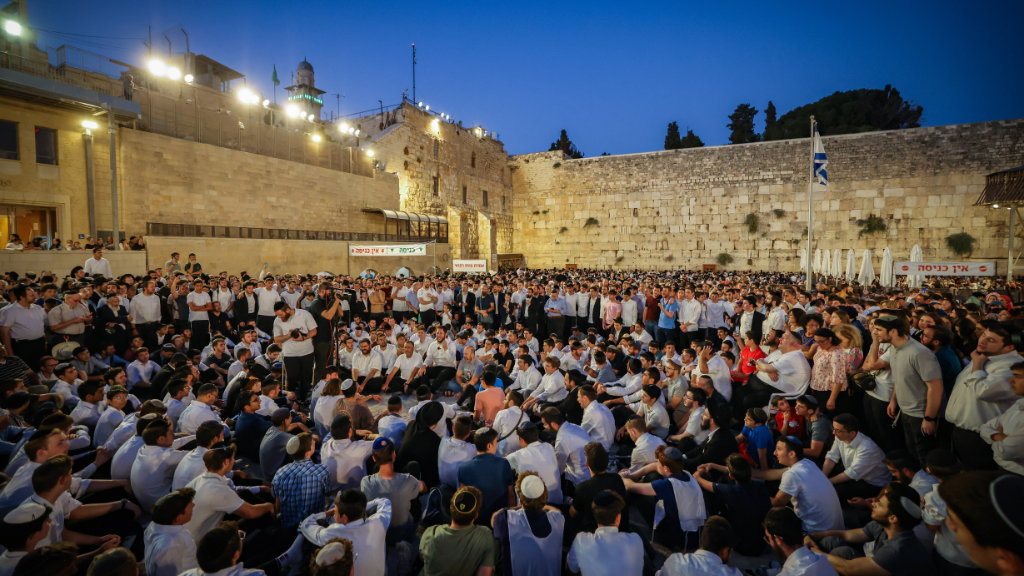Tisha B’Av – Mourning for the Destruction of the Temple
“It is a day that receives great attention in Jewish tradition but is unknown in Christian tradition, the 9th (Hebrew: Tisha) of the Hebrew month of Av. Christians do not commemorate the destruction of the temple in Jerusalem.
Because that is what 9 Av is about. It is the day commemorating the destruction of both the first and second temples.
This is done by fasting for a day (like Yom Kippur from evening to evening). In the synagogue, the book of Lamentations is read, which sings of Jerusalem destroyed by the Babylonians.
On 9 Av in 70 AD, the Romans set fire to the temple. On the same day almost six hundred years earlier, in 586 BC, Nebuchadnezzar’s troops had breached the city wall, heralding the fall of Jerusalem and the destruction of the first temple. These were the most traumatic events in Jewish history. But disasters that befell the Jews later are also associated with that day, for example the expulsion of the Jews from Spain in 1492. Tisha B’Av has therefore become a symbol for all the calamities that have befallen the Jewish people in their history.”
Renewal
“Joy cannot be complete until Jerusalem and the temple are rebuilt. At the same time, this day marks a renewal in Judaism. The temple had fallen away as the centre of worship. How was it to continue? The early rabbis took over spiritual leadership of the Jewish people from the priests (Matthew 21:43). Thus the Jewish people, who had been torn apart, were reunited.
Christians could not or would not go along with that. Early in Christian tradition, the destruction of the temple was seen as evidence of God’s final judgement on Israel. The temple servicen had come to its end. The role of the Jewish people was over. The church took its place. Had not Jesus himself foretold it when the disciples pointed out the magnificent temple complex to Him? “Not one stone will be left on another” (Matthew 24:2).
Jesus and the Temple
Could Jesus really have meant it that way? It is remarkable with how much esteem Jesus speaks of the temple.
When He overturned the tables of the money changers and the chairs of the pigeon sellers, He did so to bring the
temple back to its purpose: “It is written, He said to them, ‘My house will be called a house of prayer,’ but you are making it ‘a den of robbers’” (Matthew 21:13), quoting the prophets Isaiah (56:7) and Jeremiah (7:11). In the rendering of John’s gospel, Jesus even spoke about the ‘House of My Father’. The temple is His Father’s House. That is where the Son is a child at home, where even as a twelve year old boy, He Himself was already engaged in the things of His Father (Luke 2:49).
Joy cannot be complete until Jerusalem
and the temple are rebuilt. At the same time,
this day marks a renewal in Judaism. The
temple had fallen away as the centre of
worship. How was it to continue?
First Disciples
The temple also played an important role in the lives of Jesus’ first followers. We read of Peter and John going to the temple together for afternoon prayer (Acts 3:1). It is quite conceivable that the disciples were also together in a room in the temple complex in that early morning of Pentecost (Acts 2:1-2). Even when the letter to the Hebrews talks about the transient nature of the first covenant (Hebrews 8:13), it does not necessarily mean that the temple is no longer significant. The temple service is renewed, but not abolished.
Jesus identified Himself with the temple: “Destroy this temple, and I will raise it again in three days” (John 2:19, Matthew 26:61). So does His resurrection on the third day also guarantee the rebuilding of the temple in the Messianic kingdom? The seer John,
when he saw the new Jerusalem coming down from heaven, heard the words: “God’s dwelling place is now among the people” (Revelation 21:3). Is it the temple? But then he received a second vision of the holy city, or maybe he was looking even closer. And then it says: “I did not see a temple in the city, because the Lord God Almighty and the Lamb are its temple” (Revelation 21:22). So the temple holds a promise: God will be with mankind. So when we now remember together with Israel, the destruction of the temples, it is no longer in opposition to Israel, but sharing in the expectation, given to Israel, of the coming of that Messianic kingdom.”






